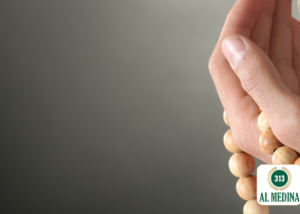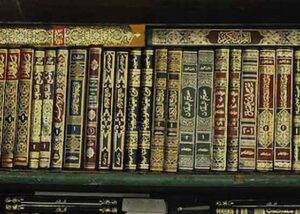Does it say in Hadith that you have to bring children inside at Maghrib time?
Quran
Hadith
Islamic Text
It is recommended to bring children inside at Maghrib time. It is not an obligation (Fard). This is how the scholars understood the Hadith.
عَنْ جَابِرٍ رَضِيَ اللَّهُ عَنْهُ، عَنِ النَّبِيِّ صَلَّى اللهُ عَلَيْهِ وَسَلَّمَ، قَالَ: ” إِذَا اسْتَجْنَحَ اللَّيْلُ، أَوْ قَالَ: جُنْحُ اللَّيْلِ، فَكُفُّوا صِبْيَانَكُمْ ، فَإِنَّ الشَّيَاطِينَ تَنْتَشِرُ حِينَئِذٍ، فَإِذَا ذَهَبَ سَاعَةٌ مِنَ العِشَاءِ فَخَلُّوهُمْ، وَأَغْلِقْ بَابَكَ وَاذْكُرِ اسْمَ اللَّهِ، وَأَطْفِئْ مِصْبَاحَكَ وَاذْكُرِ اسْمَ اللَّهِ، وَأَوْكِ سِقَاءَكَ وَاذْكُرِ اسْمَ اللَّهِ
(Sayidina) Jabir (May Allah Most High be pleased with him) narrated that the Prophet ﷺ said, ‘When night falls, then prevent your children (from going outside). For indeed the devils are abundant at that time. When a period of Isha passes then let them go. Lock your doors and mention Allah’s Name. Put out your lights and mention Allah’s Name. Cover your utensils and mention Allah’s Name.’ (Sahih al-Bukhari, 3280).
The Hadith above is clear with regards to keeping children indoors when night enters. Imam Ibn Hajr clarified that this begins at sunset. Therefore, it is advisable to bring children in at Maghrib time.
جُنْحُ اللَّيْلِ وَهُوَ بِضَمِّ الْجِيمِ وَبِكَسْرِهَا وَالْمَعْنَى إِقْبَالُهُ بَعْدَ غُرُوبِ الشَّمْسِ يُقَالُ جَنَحَ اللَّيْلُ أَقْبَلَ. (فتح الباري شرح صحيح البخاري)
Junh of the night can be pronounced with a Dammah (Pesh) or a Kasrah (Zeer). It means the entering of the night after sunset. You may say Janaha when the night enters. (Imam Ibn Hajr al-Asqalani, Fath al-Bari).
Maghrib being the start time for this ruling is generally agreed upon. However, there is more discussion and difference of opinion with regards to the end time for this ruling. The Hadith above indicated that it continues until after Isha. However other Hadith narrations allude to a time prior to that. In Bukhari 3304 we have the following wording:
فَإِذَا ذَهَبَتْ سَاعَةٌ مِنَ اللَّيْلِ فَخَلُّوهُمْ
And when a portion of the night has passed, then let them (the children) go. (Sahih al-Bukhari, 3304).
In Sahih Muslim, Hadith number 2013 – 98, it indicates that the time ends prior to Isha:
إِذَا غَابَتِ الشَّمْسُ حَتَّى تَذْهَبَ فَحْمَةُ الْعِشَاءِ
When the Sun sets until the Fahmah of Isha. (Sahih Muslim, Hadith number 2013 – 98).
The word Fahmah refers to the period between Maghrib and Isha. As explained by Imam al-Nawawi:
وَفَحْمَةُ الْعِشَاءِ ظُلْمَتُهَا وَسَوَادُهَا وَفَسَّرَهَا بَعْضُهُمْ هُنَا بِإِقْبَالِهِ وَأَوَّلِ ظَلَامِهِ وَكَذَا ذَكَرَهُ صَاحِبُ نِهَايَةِ الْغَرِيبِ قَالَ وَيُقَالُ لِلظُّلْمَةِ التى بين صلاتى المغرب والعشاء الفحمة وللتى بين العشاء والفجر الْعَسْعَسَةُ. (المنهاج شرح صحيح مسلم بن الحجاج)
Fahmah of Isha refers to its darkness and blackness. Some of them explained it, in this context, as referring to the beginning of its initial darkening. This was mentioned by the author of Nihayatu al-Ghareeb. The darkness that occurs between Maghrib and Isha is called Fahmah. And that which is between Isha and Fajr is called ‘As’as. (Imam al-Nawawi, Sharh Sahih Muslim).
This Hadith from Sahih Muslim can be used to explain the Hadith above in Bukhari (3208). Since the word Isha can be used to describe a time period between Maghrib and Isha. Therefore, it seems correct to say that this ruling of keeping the children indoors does not extend beyond Isha. It does not necessarily extend all the way to Isha.
It is also important to note that keeping children in after Maghrib is a recommendation and not an obligation. Therefore, it should not be emphasised to the degree of an obligation (Fard). Many Muslims do not understand this and over emphasise the ruling.
امنعوهم من الْخُرُوج من الْبيُوت ندبا وَقَالَ الظَّاهِرِيَّة وجوبا. (التيسير بشرح الجامع الصغير)
Prevent them from exiting the homes is a recommendation. Although the Dhahiri school said it is an obligation. (Imam Zayn al-Deen al-Munawi, al-Tyaser Sharh Jami al-Sagheer).
Since it is a recommendation (Mandoob) and not an obligation, if there is a need then one is permitted to allow children to exit at Maghrib time. Although in such cases one should recite the Ayaat and supplications of protection more diligently.
Finally, it should be highlighted that this ruling is for children. It is not applicable to adults. Rather adults are encouraged to pray Maghrib at the Masjid. Therefore, they are encouraged to leave their homes.
And Allah Most High Knows best.
-Answered by Shaykh Noorud-deen Rashid (17.08.2022)
See also:
Why should you bring in children in at Maghrib time?
Is it wrong to be alone all the time?
See also video:






